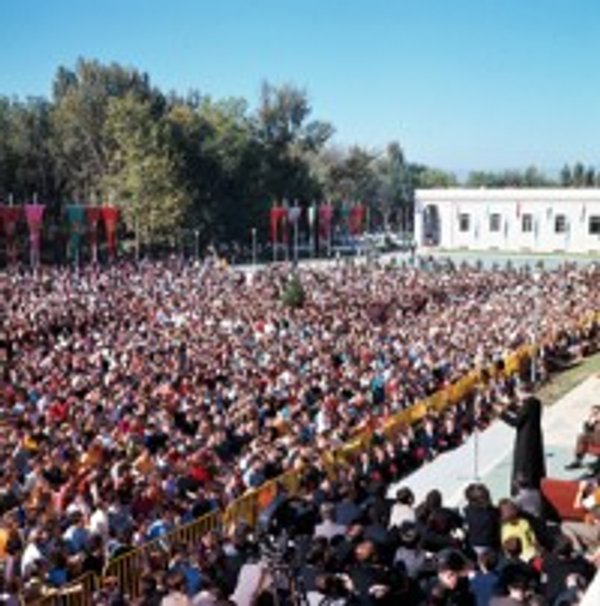“The silence of the heavens is a voice more powerful than that of a trumpet. It cries out to our eyes and not to our ears, showing us the greatness of all He has made”. These words of St. John Chrysostom affirm the harmony between God, man and the world. Genesis, the Psalms, the Sermon on the Mount reveal the direct and real communication between man and God, his creator and father.
The contemporary Christian’s mission in the world is to restore that dialogue between God and man, which has been broken by sin. After the tower of Babel, new towers (i.e., false philosophies) have been constructed over the ruins of Marxism and godless secularism. Every century sees a new attempt by man to ease God out of his mind and the world.
Forty years ago, on October 8, 1967, a priest gave a homily at the University of Navarre in Spain. Later on, he —the future Saint Josemaría Escrivá— published that homily under the title “Passionately loving the world”. As one of the thousands of students attending that Mass in the open air, I still recall the forcefulness with which he said these words: “Have no doubt: any kind of evasion of the honest realities of daily life is for you, men and women of the world, something opposed to the will of God … He waits for us every day, in the laboratory, in the operating room, in the army camp, in the university, in the factory, in the workshop, in the fields, in the home and in all the immense panorama of human work. Understand this well: there is something holy, something divine, hidden in the most ordinary situations, and it is up to each one of you to discover it”.
But is it possible to find God in the so-called “temporal affairs”? Can one speak of “loving the world” if St. John the evangelist had said that all there is in the world is “the concupiscence of the flesh, the concupiscence of the eyes, and the pride of life?” Certainly, because it is the same St. John who transmitted to us the consoling truth that “God so loved the world that He gave His only Son” to redeem it. The moment God became “Emmanuel” (God with us) in order to redeem mankind, the material world has also undergone a regeneration (Rom 8:19-21).
In one of his weekly addresses in 1980, Pope John Paul II said that “In man, created in the image of God, there has been revealed, in a certain sense, the sacramentality of the world.” (italics added) In other words, as in the analogous case of the sacrament of the Holy Eucharist, God’s creation – the world – is a “meeting place” for God and man, where man can recognize the mystery of God who loves him. Dialogue between two friends (as Genesis describes God’s encounters with Adam in Paradise) comes about spontaneously the moment love’s presence is acknowledged.

Bishop Javier Echevarría, the present prelate of Opus Dei, commenting on St. Josemaría’s above-mentioned homily during a conference in Seville five years ago, said: “But man was not created only to contemplate the cosmos, to marvel at the vastness of the universe, but also to imprint there, with the language of his work, his reply to God’s love (Cf. Gen. 2:15). In entrusting the world to man, God offered him the material upon which to write his filial response to the divine love that brought him to existence.” (italics added)
Indeed, man’s achievements by his labor and intellect, once separated from his “filial relationship” with God, would end up in either of two things: self-worship (the capital sin of pride) or world-worship (the capital sin of greed, which is according to St. Paul as bad as idolatry). Marxism as an atheistic theory of materialism has been discredited; but pride and greed are “no respecter of theory” — they thrive equally well in Marxism and in democracy.
“God is Love”, was Pope Benedict’s bold and simple message to the world in his first encyclical. If only we put love, i.e., God’s gift of love, in our daily encounters with other people in the context of our daily work, and if we could work with sincere desires to serve others, then God would not be a “distant God” for many people. Quoting St. Josemaría: “Man’s great privilege is to be able to love and to transcend what is fleeting and ephemeral. He can love his fellow men, pronounce an ‘I’ and ‘you’ which are full of meaning … This is why man ought not to limit himself to material production. Work is born of love; it is a manifestation of love, and is directed toward love.”
Today, “corporate social responsibility” (CSR) is much-discussed in corporate boardrooms and in the media. It is a positive indication of the sincere concern of businessmen towards people’s pressing needs in healthcare, education, livelihood, housing, etc. And we wish that CSR not be seen as reserved to “big business” because, in fact, social responsibility is — before being “corporate” — personal. In the end, what counts most is the way we look at our neighbor: either as an individual, worthy of respect and love, or as a mere means of achieving financial gains. It makes a world of difference because it can make one see in that work environment either God or one’s selfish interests.
A teacher patiently teaching grammar to her grade school pupils, a car mechanic putting his best efforts, a town mayor helping farmers improve their rice harvest, a waiter cheering up his customers’ birthday party — are they not realizing through their work Our Lord Jesus Christ’s assurance that whatever we do to help our neighbor is actually done to Him?
*Msgr. Joseph Duran is the Regional Vicar of Opus Dei in the Philippines.
